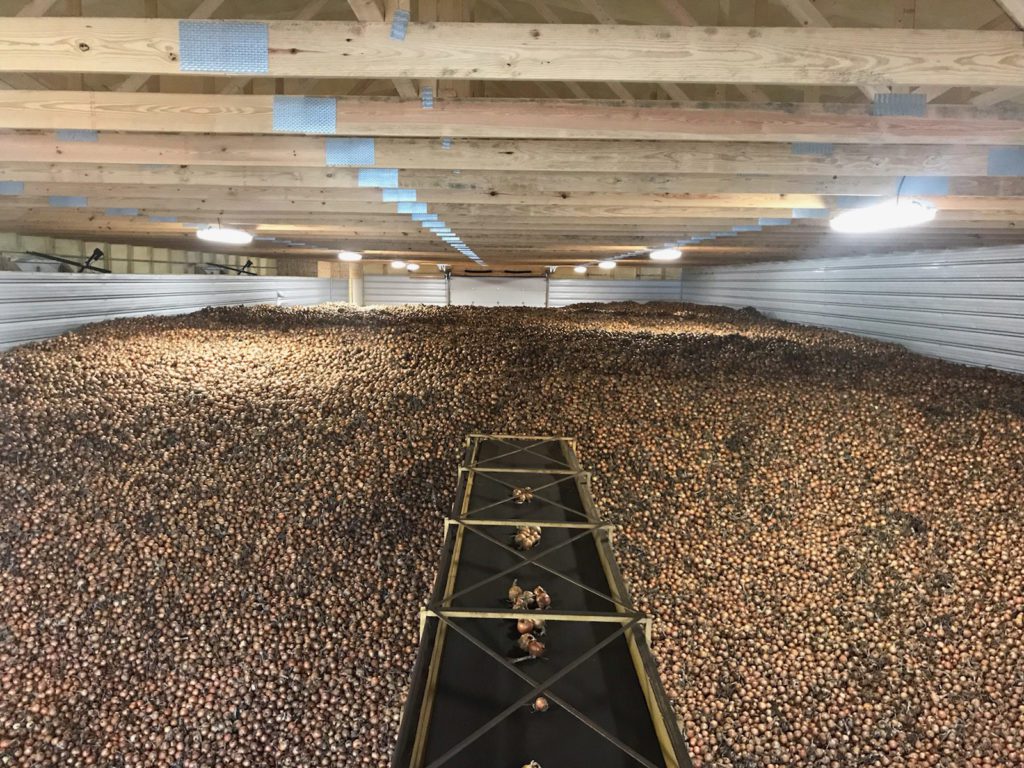Apr 23, 2019How onion growers stay sustainable
The National Onion Association’s membership works hard to keep their operations sustainable.
From the use of onion as a raw “onion power” to power up facilities, to protecting workers and the land, America’s onion farmers work hard every day to create the most sustainable programs possible.
It’s not only right for the country, but their families as they continue to feed America.
This Earth Day, remember the onion farmer, and his/her contributions, to keeping the Earth healthy, while they help feed America.
Here are some great examples of sustainable practices in the onion world:
‘Onion Power’
Ten years ago, Gills Onions in California created a system whereby it uses onion remains (tops, skins, stems and tops) to create energy, a system that now has generated more than 25 gigawatt hours of electricity – enough power to supply a year’s worth of power to 460 residential homes. The Advanced Energy Recovery System provides 100 percent of the base electrical load of Gills’ processing plant in Oxnard, Calif. Gills to this day is working to achieve greater efficiency and energy independence.
“It’s hard to do business in California, but also it challenges us to think outside of the box. So, onion juice power was (owner Steve Gill) thinking outside of the box. He created a program that did not exist in the world.”
Using all of the onion
Our farmers continue to close in on the idea of zero waste. There are continually new ways of using all of the onions. From the tops and stems in production facilities, to the “culls” left over in the field being used for sheep feed, and shredded for cattle crazing.
- Sakata Farms in Colorado routinely trucks its culls to area sheep farms.
- Fashion designers in New York are using onion skins as natural dyes for their fabrics. A group of students working with the Fragmentario studio in New York City will unveil its onion fabrics during NY Textile Month in September. (Contact: Maria Elena Pombo, Fragementario Studio, https://fragmentario.co/)
- Gumz Farms in Endeavor, Wis., has installed a high-tech, humidity and temperature controlled circulation system, which allows it to store onions longer, reducing waste. Gumz also is a member of the Healthy Grown program in Wisconsin, which ensures their commitment to sustainability.
Coveting the land
America’s onion farmers work diligently to keep soils healthy to grow the best products to put on the table. They follow researchers from around the world to implement the best practices.
Says Dylan Dembeck of Minkus Family Farms in New York:
“Many people think commercial agriculture hurts the land, but they don’t realize it is in our best interest to keep the land as fertile as possible to continue to produce high-quality produce for generations to come. Not only are sustainable farming techniques good the for environment it is also very good for farmers. We are able to achieve higher yields, better quality product, and decrease our overall chemical applications. These things are all better for the environment and they help farmers increase their bottom line to ensure they can continue to farm for many years to come.”
At Potandon Produce in Idaho, soil ph and nutrient levels are constantly monitored to reduce fertilizer use.
Reducing footprints
- Minkus Family Farms in New York has installed solar panels to reduce its footprint; it has built 62 skylights in their warehouse, almost completely eliminating the need for lighting in tis warehouse. Use exclusively LED lights. It also uses 10 large 20-foot fans to reduce building temperature, to avoid as much air conditioning as possible.
- Potandon Produce in Idaho also recycles fresh water in an overall water management plan, uses poly bags printed with water-based inks and uses only recycled materials in its master containers. Corrugated and cardboard containers are sourced from suppliers that are part of the Sustainable Forestry Initiative Program.
- Grimmway Farms in California has a 4.75 megawatt solar from to help power its facilities, along with a multifaceted sustainability program to reduce its footprint.
Water management and soil protection
- Fagerberg Farms in Eaton, Colo., uses subsurface drip irrigation, an innovative watering practice that requires less water, fewer chemicals and more efficient applications. Fagerberg has been recognized in the farming industry for its sustainable farming practices.
(Source: Fagerberg Farms, https://fagerbergproduce.com/) - In Glennville, Ga., G&R Farms constantly monitors its varieties to get the best yields with the greatest efficiencies. Part of that is water management.
“On the field side, we try to be very protective of the water, and make sure we don’t have any washing in the field or erosion. We put in cover corps in the off season to protect the till for the soil. Our goal is to use less and less fertilizer,” said Cliff Riner of G&R Farms. “We have to stay on top of the curve to provide the best product we can.”
The National Onion Association was incorporated in 1913 and represents more than 500 onion growers, shippers, packers and suppliers throughout the United States.
– National Onion Association
Above, the Gumz Farms storage facility in Endeavor, Wis. Photos: National Onion Association

















